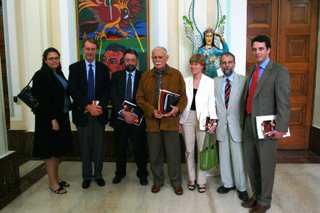Blogging from Washington, Return from Caracas

The delegation (pictured here with Venezuela's Vice-President Rangel) is back from Caracas. We have a few more observations about our meetings on Monday. And soon, we’ll talk about our ultimate objective: starting a civil dialogue between leaders in Venezuela and the United States.
***
On the day the delegation met Tibisay Lucena, president of the National Electoral Council (CNE), 88 political organizations were in final meetings to determine the ballot positions of 23 candidates for the presidency of Venezuela.
The CNE has enforcement and regulatory responsibilities for auditing the electoral system, testing voting machines, enforcing the rules that prohibit civil servants from electioneering at work, and providing the candidates with a small measure of free broadcast time which they can air their messages. CNE will also be determining the participation of both national and international election monitors for December’s presidential vote.
For Venezuela’s sixteen million registered voters – in a highly polarized political climate – the members of the CNE are key actors in guaranteeing that the upcoming ballot for president is free and fair, in perception and fact.
As Ms. Lucena told us, “Elections are a big investment in democracy.” Members of the delegation asked whether the CNE had sufficient resources to enforce the law. “People have to get accustomed to the rules and their enforcement,” she said. This is an election to which the world will be paying close attention.
***
The delegation had the honor and privilege of meeting with the Vice-President of Venezuela, Dr. Jose Vicente Rangel. The delegation discussed with the Vice-President the purpose of the delegation and the goal of the Center for Democracy in Americas for its Venezuela program: breaking through the confrontational state of U.S.-Venezuela relations and bringing people together.
The Vice-President indicated his support for this goal, and made a number of observations. He said:
1. Venezuela is seeking a normalized relationship with the United States
2. Politics aside, aspects of U.S.-Venezuelan relations (e.g. trade) go quite well
3. Venezuela would like to broaden cooperation with the United States, and mentioned the topics of interdicting drugs and stopping terrorism
4. Venezuela would like to put the relationship on better footing, and would pursue the discussion of delicate issues in private
5. U.S. actions in the hemisphere have damaged its image and its efficacy in dealing with the nations of the region
As you might expect, the Vice-President predicted that President Chavez would win the election in December. But, he asked, why should President Chavez begin his next term with an anti-U.S. mandate?
***
Our meeting with Vice President Rangel reminded us of the urgency of getting moving this dialogue in a more positive direction. In our posting to come, we will talk about how we can approach this project.

5 Comments:
CNE is a tool of Chavez. He controls the members, the voting machines and the software. CNE refuses to allow real audits of the voter roles. It has been established that CNE will refuse to allow audits of the actual vote during the election. Chavez has already threatened a civil war if he loses the election. He has stated publicly that he has no intention of turning over power during his lifetime. Venezuelans are now prisoners of this madman. May God help them.
September 28, 2006 6:58 AM
During our trip we did meet with Ignacio Avalos of Ojo Electoral, an independent organization that had just finished an audit of the voter registry. He told us that Ojo had audited the registry and found it usable for the presidential election.
September 28, 2006 9:39 AM
The voter rolls have been independently audited by a group of universities, including Catolica and others who are not known for their pro-Chavez positions. They found some errors, and worked with the CNE to correct them. They said that the CNE was open, transparent, and eager to correct problems with the voter rolls.
I think a lot of this "CNE is biased" argument stems from opposition groups who have a hard time understanding that their position is not shared by the majority of Venezuelans.
Chavez has never threatened a civil war. Neither has he stated that he has no intention of turning over power. He has said that if term limits are overturned by a public referendum, he would consider running for office again (as Uribe just did in Colombia).
Please, let's have a fact-based discussion.
September 28, 2006 10:56 AM
Onward with the Chavista propaganda. Nice to see you're archiving your complicity with the criminial Venezuelan regime.
September 29, 2006 10:28 AM
The only "audit" of voter roles was done by handpicked Chavista lackeys. CNE would not allow legitimate Universities to be part of the audit. This is fact... The only lies coming out of Venezuela these days are from the Chavistas. Over half of the population no longer has any civil rights. Those that signed the recall list are no longer considered citizens by Chavez. There are more murders every day in Venezuela than in Iraq. While Chavez gives away oil and plays the fool, thousands more homeless pick through the garbage on the streets of Caracas. Roads, bridges, buildings are deteriorating at an alarming rate. You cannot even mail a letter in Caracas any longer... It will be stolen before it gets to the recipient. FACTS... Chavistas cannot handle the FACTS.
September 29, 2006 11:40 AM
Post a Comment
<< Home